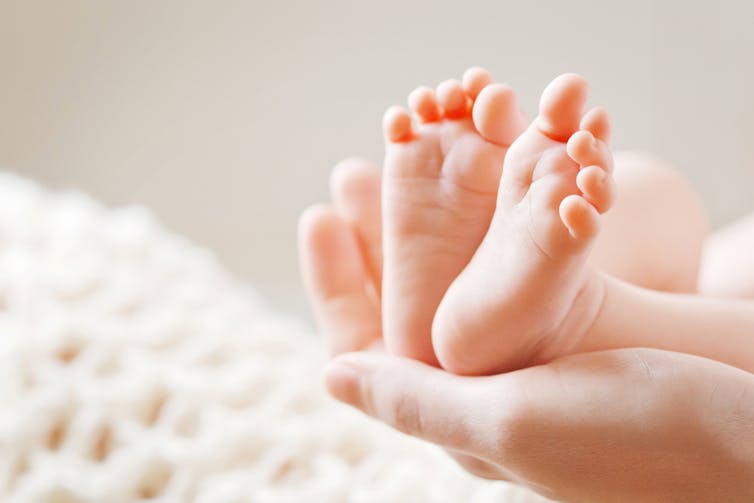How does being overweight affect my fertility?
- Written by Karin Hammarberg, Senior Research Fellow, Jean Hailes Research Unit, School of Public Health & Preventive Medicine, Monash University
The proportion of Australians who are overweight or obese is at an all-time high. We know excess weight is linked to many adverse health consequences, but there is now growing understanding that it also affects fertility.
Excess weight affects female fertility
A fine hormonal balance regulates the menstrual cycle. Overweight and obese women have higher levels of a hormone called leptin, which is produced in fatty tissue. This can disrupt the hormone balance and lead to reduced fertility.
The quantity and distribution of body fat affect the menstrual cycle through a range of hormonal mechanisms. The more excess weight and the more abdominal fat, the greater the risk of fertility difficulties.
Read more: Five ways to boost your nutrition before pregnancy
Excess weight, particularly excess abdominal fat, is linked to insulin resistance (when the body has to produce more insulin to keep blood sugar levels normal) and decreased levels of sex hormone-binding globulin (SHBG), a protein that is involved in the regulation of the sex-hormones androgen and oestrogen.
This increases the risk of irregular menstrual cycles, which in turn reduces fertility. One study found women who were obese were much less likely to conceive within one year of stopping contraception than women in the normal weight range (66.4% of obese women conceive within 12 months, compared with 81.4% of women of normal weight).
Changes in the fine-tuned hormonal balance that regulates the menstrual cycle triggered by excess weight and obesity also increase the risk of anovulation (when no egg is released by the ovaries). Women with a body mass index (BMI) above 27 are three times more likely than women in the normal weight range to be unable to conceive because they don’t ovulate.

Women who are overweight or obese are much less likely to conceive. from www.shutterstock.com
Many women who carry excess weight still ovulate, but it appears the quality of the eggs they produce is reduced. The evidence for this is that among women who ovulate, each unit of BMI above 29 reduces the chance of achieving a pregnancy within 12 months by about 4%.
This means that for a woman with a BMI of 35, the likelihood of getting pregnant within a year is 26% lower, and for a woman with a BMI of 40 it is 43% lower compared with women with a BMI between 21 and 29.
And when couples use IVF to conceive, the chance of a live birth is lower for women who are overweight or obese than for women with normal BMI. On average, compared to women in the healthy weight range, the chance of a live birth with IVF is reduced by 9% in women who are overweight and 20% in women who are obese .
Excess weight affects male fertility
In men, obesity is also associated with lower fertility. This is likely due to a combination of factors. These include hormone problems, sexual dysfunction and other health conditions linked to obesity such as type 2 diabetes and sleep apnoea (which are both associated with lowered testosterone levels and erectile problems.
Read more: Why men need to think about their fertility too
It’s estimated carrying an extra 10 kilos reduces male fertility by 10%.
A review of studies on the effects of paternal obesity on reproductive outcomes found obese men were more likely to experience infertility and less likely to have a live birth if they and their partner used assisted reproduction technology (ART) such as IVF.
This is thought to be because obesity not only reduces sperm quality, it also changes the physical and molecular structure of sperm cells.
The good news
While the facts about obesity and fertility can seem daunting, there is some good news too. Weight-loss interventions, particularly those that include both diet and exercise, can promote menstrual cycle regularity and improve the chance of pregnancy. In obese women with anovulatory infertility, even a modest weight loss of 5-10% improves fertility and the chance of conceiving.
Read more: Sins of the father: heavier dads mean overweight kids
A weight loss of 7% of body weight and increased physical activity to at least 150 minutes a week of moderate intensity activity is recommended to improve the health and fertility of people who carry excess weight.
Lastly, men and women are twice as likely to make positive health behaviour change if their partner does too. So becoming pregnant will be more likely if you diet and exercise together.
Authors: Karin Hammarberg, Senior Research Fellow, Jean Hailes Research Unit, School of Public Health & Preventive Medicine, Monash University
Read more http://theconversation.com/how-does-being-overweight-affect-my-fertility-95224



















